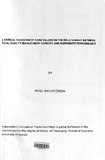| dc.description.abstract | Total Quality Management (TQM) has become, according to one source, 'as pervasive a part of business thinking as quarterly financial results,' and yet TQM's role as a strategic resource remains virtually unexamined in strategic management research. Drawing on the resource approach and other theoretical perspectives, this paper examines TQM as a potential source of sustainable competitive advantage, reviews existing empirical evidence, and report’s findings from a new empirical study of TQM's performance consequences. The previous researches suggest that most features generally associated with TQM such as quality training, process improvement, and benchmarking do not generally produce advantage, but that certain implicit, behavioral, imperfectly imitable features such as open culture, employee empowerment, and executive commitment can produce advantage. The researchers concludes that these implicit resources, and not TQM tools and techniques, drive TQM success, and that organizations that acquire them can outperform competitors with or without the accompanying TQM ideology
This paper further examines the relationship between total quality management (TQM) and innovation performance and compares the nature of this relationship against quality performance. The researchers suggest that TQM significantly and positively relates to both product quality and product innovation performance although it appears that the magnitude of the relationship is greater against product quality. In addition, significant causal relationships between quality performance and innovation performance were found, suggesting that achievement of one aspect of performance could impact the other.
Corporate culture does matter. It has been revealed from the previous researches that the strength of corporate culture significantly affects corporate policies such as employment policy, management structure, and financial structure. It has also been confirmed that the culture and its embedding contribute to better corporate performance. These culture effects are found to be considerable in magnitude and at least as large as those of other factors. Therefore it is important to recognize the existence of the culture for understanding corporate policies and performance.
Total quality management (TQM) has an internal focus on a corporation’s business operations. Additionally, it has an external focus. A rare topic examined in these contexts of TQM is ethics. In the first place, the core values of TQM should be built upon ethical fundamentals. On the other hand, techniques and tools used in the implementation of TQM should also consider these ethical fundamentals. An internal approach of ethics in TQM stresses the issue of corporate ethics in intra-organizational business operations, while an external approach of ethics in TQM stresses the issue of business ethics in inter-organizational business operations. This review has revealed that TQM is not only about figures, profits and costs. It is also a business approach that should penetrate all activities inside and outside that are relate to the corporate performance.
Key: Core values, Relationship, Total Quality Management Concept, Corporate Performance | en_US |

